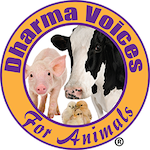During this month’s Mindfulness & Meditation Retreat for Animal Activists, a retreatant asked Bhante the following question.
“Bowing in, I was very interested in what your experience has been growing up in a Buddhist country. We’re particularly interested in the Mercy release practice and the fact that slaughterhouses were closed down on the holiday. Bowing out.”
 So you all know the Buddhist calendar goes to the moon. It’s a moon calendar. So the full moon of May is Vesak day, and this year the full moon is happening on May sixth. That’s the day we are celebrating the birth of the Buddha and the awakening of the Buddha, and the passing of the Buddha.
So you all know the Buddhist calendar goes to the moon. It’s a moon calendar. So the full moon of May is Vesak day, and this year the full moon is happening on May sixth. That’s the day we are celebrating the birth of the Buddha and the awakening of the Buddha, and the passing of the Buddha.
Because the birth of the Buddha happened on a May full moon day, and 35 years later, he became awakened on the same May full moon day, and the Buddha passed on the same May full moon day.
All these events happened outside under trees at the park, Lumbini, where the Buddha happened to be born when Mother Maya Devi was traveling from the kingdom of the husband and going towards her parents, and she happened to deliver a baby on the way, and they just quickly arrange a place in a park for the birth. The birth of the child happened in the park, Lumbini.
Then awakening happened under the Bodhi tree 35 years after, on the same full moon day.
Then passing happened. The park’s name was Upavattana, so the Buddha has a passing.
So to celebrate these three events we have, we are having the celebration of Vesak Day.
But in the Western world was naming this day as a day of Buddha’s birth. Because in the Western world, we celebrate birthdays for everybody. Then with the Western mind encouraged to have this birth of Buddha, the birthday of the Buddha.
In the Eastern way, we don’t talk about birth. Buddha was important for us because of his awakening.
Then for in the Eastern world, we only say that it’s a day of awakening. Now because of the awakening because of the Buddhahood, we respect his birth because of the Buddhahood, we respect his passing. Otherwise, it’s not an important day for us. Therefore, the most important thing to remember of this day is it’s a day of awakening.
But even when we talk about Vesak day, and I go for a few talks, and during the Vesak time, I always call that a day of awakening celebration of the awakening of the Buddha.
Now, this is a celebration of awakening, as I am growing up back in Sri Lanka, and that was a day we went, for we go for a retreat.
Observe the eight precepts, or maybe most people observe ten precepts on that day, and then, the retreat is about self-reflection. You will have a dharma talk. You will have a meditation practice. It’s all about recognizing yourself, and also top of that, you are practicing compassion.
And, of course, people even don’t break an egg on that day, and it’s a completely, I mean nationwide, it is a non-harmful day. No killing or not harming animals. Also, nobody eats meat on the day, but as a practice, what we do, we might release animals from slaughterhouses. As we were growing up, I remember our family was sponsoring, we were paying for the cow to release a cow from the slaughterhouse.
And that is where that’s a very common practice that people do. And also when we grow up, actually, there’s another story. We never kill cow. Cow is part of the family.
I think that’s even family in this part of the world, too. And if you are growing up in a farmhouse, most people do the same way. You don’t kill them. It’s a cow being a family, and they just toil around. And then, you take milk from the cow.
I remember when I was growing up, a wonderful Cow had passed, and we dug a hole, and we buried the cow, and we never kill our cows.
So as a part of the practice, actually, then, you feed the cow, and you feed the animal on the day especially, and you organize certain events. I know even these days, our DVA group in Sri Lanka they are even we are not as DVA we don’t organize it, but individually organizing street Animal feeding day as they are being active with that. Feeding dogs and feeding street dogs and releasing cows from the slaughterhouse, that type of thing they do.
But what the main thing is, you are practicing compassion at the same time you are recognizing how much you want to live, that much other living beings want to live. Then you are being practical with that. You don’t harm any living beings, directly or indirectly.
Even though you are not vegetarian on the full moon day, as a Buddhist, you don’t do that.
But as a practice, it’s a retreat day for people. It’s a national holiday, of course. The full moon of the Vesak, and the day before the Vesak day, is also a national holiday.
And I think this is very common with the Burma and Thailand also.
So hopefully, I answered the question.

